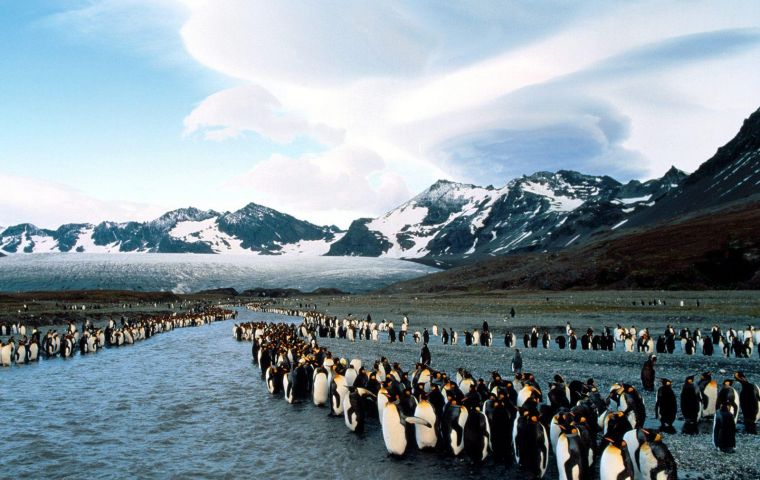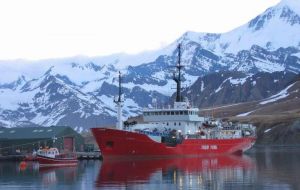MercoPress. South Atlantic News Agency
SGSSI Commissioner’s 12-Day Visit To South Georgia
 Participants of the visit headed by Commissioner for South Georgia & the South Sandwich Islands, Nigel Phillips CBE.
Participants of the visit headed by Commissioner for South Georgia & the South Sandwich Islands, Nigel Phillips CBE.  The visit took place on board UK flagged Government’s vessel MV Pharos SG, and provided an opportunity to further collaboration and partnership
The visit took place on board UK flagged Government’s vessel MV Pharos SG, and provided an opportunity to further collaboration and partnership The Commissioner for South Georgia & the South Sandwich Islands, Nigel Phillips CBE, returned on March 17th from his visit to South Georgia where he was accompanied by representatives of some of South Georgia’s key partners and stakeholders.
The visit took place on board, and was ably facilitated by, the UK's flagged Government’s vessel MV Pharos SG, and provided an opportunity to further existing collaboration and partnership through experiencing some of the shared challenges and opportunities facing our natural and cultural heritage. The Commissioner brought together representatives from stakeholders including the Falkland Islands Government, UK Parliament, British Antarctic Survey, Foreign & Commonwealth Office, International Association of Antarctica Tour Operators and Centre for Environment, Fisheries and Aquaculture Science, as well as the Rector of South Georgia. Discussions were framed by visits to some of South Georgia’s most significant wildlife and cultural heritage sites.
Participants arrived at GSGSSI’s administrative centre at King Edward Point and had the opportunity to meet staff from GSGSSI, British Antarctic Survey and the South Georgia Heritage Trust to see firsthand the work being done to conserve both the natural and human heritage of the island. As well as a chance to see scientific study sites used by the British Antarctic Survey to monitor higher predators such as penguins and seals, the group were able to visit the tide water glaciers in Cumberland Bay which are retreating by up to 1 meter a day. The Rector took a rare opportunity to lead a Sunday service of Holy Communion at the old whalers church at Grytviken.
The visit incorporated landings along the coast including: Gold Harbor, home to 25,000 pairs of king penguins as well as elephant and fur seals; and Stromness, site of the abandoned whaling station which marked the end of Sir Ernest Shackleton’s epic traverse of South Georgia in 1916. Nearly 9,000 tourists visit South Georgia each year to visit sites such as these and with numbers due to grow further discussions considered some of the challenges of continuing to facilitate safe and sustainable tourism in the future, and approaches to managing the wildlife and cultural heritage in that context.
Constant companions on the voyage were the albatross. Visit participants got to see breeding sites first hand during landings on Prion Island and Bird Island, the latter the site of the British Antarctic Survey station and some of the longest-running environmental monitoring programs in the Southern Ocean. Recent archipelago-wide surveys have shown that these iconic species are in decline. While independent observers confirm that none are being caught in South Georgia’s fisheries, incidental mortality associated with fisheries operating outside of the maritime zone is one of the likely causes. GSGSSI last year launched conservation plans to help better understand and address the threats to these albatross alongside efforts to continue enhancing bird by-catch mitigation practices on fishing vessels. Partnerships between Overseas Territories, UK Government, science organizations, fishery operators and the tourist industry are likely to be key to successful future conservation outcomes.
Bio-security remained a strong theme throughout the visit with mandatory pre-arrival bio-security checks to avoid the transfer of any non-native species to the Territory. This followed the ‘clearance’ of the vessel in Stanley by the GSGSSI’s rodent detector dogs which are taking part in a trial bio-security program based in the Falkland Islands. The dogs will operate on vessels departing for South Georgia from the Falkland Islands but will also be available to spend time internally in the Falkland Islands and at Mount Pleasant until mid-May.
The Commissioner Nigel Phillips was grateful to all the participants of the visit who gave a significant amount of their time in order to understand and contribute to the efforts of the Government of SGSSI to continually improve its management of a globally significant marine and terrestrial environment. (South Georgia Newsletter, February edition).




Top Comments
Disclaimer & comment rules-

-

Read all commentsEngland will return the Malvinas within 25 years.
Apr 06th, 2018 - 02:59 am 0England will return the Malvinas within 25 years.
Apr 09th, 2018 - 12:41 am 0Commenting for this story is now closed.
If you have a Facebook account, become a fan and comment on our Facebook Page!